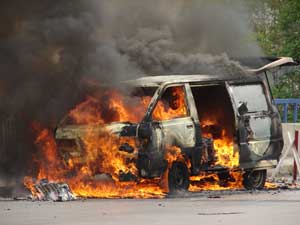by Subhayu Bandyopadhyay
 A major current threat to the U.S. and the global economy is terrorism. In their 2012 book The Political Economy of Terrorism, economists Walter Enders and Todd Sandler define “terrorism" as premeditated use of or threat to use violence by individuals or subnational groups to obtain a political or social objective through the intimidation of a large audience beyond that of the immediate victims.1
A major current threat to the U.S. and the global economy is terrorism. In their 2012 book The Political Economy of Terrorism, economists Walter Enders and Todd Sandler define “terrorism" as premeditated use of or threat to use violence by individuals or subnational groups to obtain a political or social objective through the intimidation of a large audience beyond that of the immediate victims.1
Among other effects, such threats reduce investments in affected nations and impact both capital formation and employment. To gain international attention to their activities, terrorists often disproportionately target tourism, transportation or foreign direct investment (FDI). In turn, this affects a targeted nation’s exports and imports.
How Does Terrorism Affect Trade?
There are a few central channels through which terrorism may affect trade:
Terrorism increases uncertainty, which raises the cost of traded goods, especially relative to similar goods produced in a terrorism-free country.
Terrorism increases the cost of doing business by raising both insurance premiums and security costs, which decreases the competitiveness of goods.
Terrorism slows the flow of goods and resources through ports due to greater inspections and safeguards.
Trade can be reduced as purchasing power drops from loss of income when production is disrupted.
Terrorism can divert government expenditures from more productive public investment to less productive security activities.
Types of Terrorism and Their Sectoral Effects
Terrorism is composed of two parts: domestic and transnational.
In domestic terrorism, the perpetrators and victims are all citizens from the venue country. An example is the April 19, 1995, bombing of the Alfred P. Murrah Federal Building in Oklahoma City by Timothy McVeigh.
Transnational terrorism occurs when the venue, perpetrators or victims involve two or more countries.
My recent paper, co-authored with Todd Sandler and Javed Younas, looked into the effects of total, domestic and transnational terrorism on international trade.2 We found that the manufacturing sector experienced the greatest harm from terrorism. Within manufacturing, we found that effects of terrorism were more damaging to high-skilled production than low-skilled production.
Generally, the detrimental effect of transnational terrorism on various trade variables was almost double that of domestic terrorism, indicating that transaction cost and other considerations associated with transnational terrorism were more trade-inhibiting than those tied to domestic terrorism.
Furthermore, the contrasting effects of the two forms of terrorism were more pronounced for developing countries, which may be less able than their developed counterparts to alleviate transnational terrorism and its consequences due to weaker institutions.
Total terrorism had a significant negative impact on trade in all products, primary commodities and manufactured goods, with a stronger detrimental influence manifested on manufacturing.
When manufacturing sectors were decomposed by resource or skill intensities, transnational terrorism continued to have a more marked effect on trade than domestic terrorism. There was a noteworthy tendency for higher-skilled manufacturing to sustain a more adverse trade impact from alternative forms of terrorism, with some peaking at a skill level below the greatest.
Notes and References
1 Enders, Walter; and Sandler, Todd. The Political Economy of Terrorism, 2nd Edition, New York, Cambridge University Press, 2012.
No comments:
Post a Comment